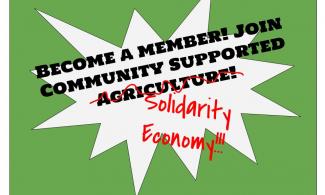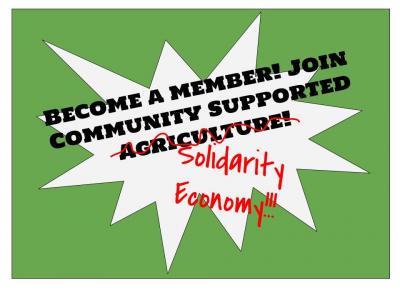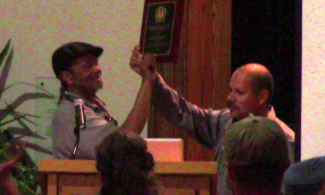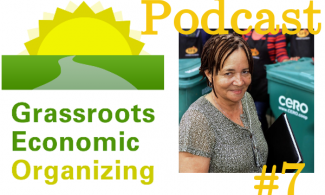
We as the solidarity economy movement are not at the political, economic, or cultural scale that we need to be at to start seriously addressing in real practice the idea of large scale markets vs. planning. That is to say, we don’t have a grassroots political movement or the office holders to seriously make a state or the country try a large scale planning system instead of markets. We also don’t have the scale of economic institutions to meet the needs of whole cities and regions even if they did have a planning mechanism, and we don’t have enough working class people bought into the idea of the solidarity economy to supply a grassroots level of demand that could help propel our economic and political work.
Which is precisely why we need to start (or rather keep) debating and strategizing as a movement about the long term trajectory of our work and how it aligns to build a healthy world. That means that big questions like planning vs. markets is a reality that we need to orient our work towards once we have a well thought out and theorized vision of what a good structure for this could be. We know that all of it is still experimental, that we are only building a foundation for larger changes to come, and that means we have to start setting up our projects and organizing to aim at those bigger changes right now while they are being developed.
I wish for this to contribute to the debate about systems change particularly in reference to scale, accessibility, and markets vs. planning.
As the solidarity economy movement, particularly the worker co-op movement, we have a lot of energy going into organizing and building the supply side of solidarity economy. That is to say: we are all trying to build a lot of businesses that have worker owners. Obviously that’s a logical and good place to start for the sake of concrete change in worker lives, and arguably building a political power base of democratic worker owners. Of course, we are all running into the interesting and complicated spot of scale and markets.
I’m going to try to make this very simple for the sake of a short read that is to the point. I’m only going to be presenting a certain set of a few ideas, not tackling all aspects of these questions full on.
To have lots of badass, social justice, ecological worker co-ops, we need to have demand for the products or services they produce. Someone has to be willing to buy stuff from them at a price that allows a living wage. So a big part of our market as a lot of worker co-ops has become middle class white liberals. They can afford to shop according to their values. If we don’t target them we start to risk competition with other firms that provide the same good or service but also have an economic “advantage” through worker exploitation, pollution, etc. We also come across the problem of not connecting and being a part of the working class since our goods and services are out of their price range, not in their stores, and generally inaccessible.
Arguably, once we have met the demand of the small base of middle class white liberals who will buy our products reliably, we need to access new markets/demand to scale up our enterprises. Recently there has been an answer to this which is going for large, anchor institutions as a market (hospitals, nursing homes, colleges, school districts, etc.) that can pay for a wholesale amount of good/service and allow a stable market for a scaling worker co-op. Some co-ops use the interest of the institution in green, socially responsible products as the reason to contract with them where other co-ops go for a competitive price and many probably do some of both. Either way, the big buyer demand is an exciting (and not without its own huge challenges) market that can help scale our work and movement. It’s definitely part of our strategy here in Northfield MN.
I’d like to propose a second (another) option. This is an idea that both meets the need of a new and expanded market (so we can grow), and addresses the problem of working class accessibility. The bigger idea came to us while doing a micro version of it as part of starting up a local composting worker co-op here in Northfield MN. To test for how much of a market for curbside compost collection there would be in our town, we knocked on doors and asked people about their interest, the price they’d be willing to pay, and if they prefered an out of town provider or a local business. We know that we can launch the business at 500 subscribers (we’re a little bit over 100 right now and going strong) and thus it’s a matter of finishing the organizing of the demand side.
Before explaining the idea in depth, there is already a great micro example that is already common in the sustainable food economy: the CSA, Community Supported Agriculture.
The CSA was born out of the need from farmers for a steady and reliable market for their crops. Farmers markets proved to be too unpredictable as far as how many people would buy how much of any of your crops each week. The basic CSA model is:
Farmers sign up consumers for a year long service of weekly fresh vegetables.
The consumer becomes a member of the CSA and pays for the whole year's worth of vegetables up front, before the growing season. (Or in a series of smaller payments)
The farmer uses this money to finance that season's work without worry, and is able to plan for how many crops, which ones, and how often, with the responsibility resting on the CSA member to utilize the service they have already paid for.
What this is is highly decentralized, grassroots economic planning. Farmers plan their business based on a committed set of buyers with skin in the game through an early investment and thus do not suffer at the potential whims of the market on an inconsistent timeline.
What if we used this model for not just fresh produce but a range of other goods and services? It’s of course gonna be different in every industry but the basic idea is the same. What if we could turn from just Community Supported Agriculture (economic planning for one farm) to a Community Supported Solidarity Economy (economic planning for a whole local economy)?

Here’s the idea for using this simple tactic in a bigger way to help us scale:
We continue the legacy of buyers clubs, cooperative purchasing societies, and consumer co-ops in a new way. Through grassroots organizing, we sign people up to commit to buying specific goods and services from the cooperatives that exist/we create. They commit to a timeline of purchasing, prices, and any other necessary participation. We use these commitments to not only fill demand for current businesses but also to organize markets to meet thresholds in order to launch new businesses too.
Here’s a way that makes sense to me. All of this is merely ideas, anything can be done with any of but I’ll offer a starting point:
We as solidarity economy organizers develop business plans for many businesses that could exist in our local economies if the demand side was organized and committed relatively long term. We specifically aim to understand the threshold of consumers it would take to launch the business. We continue planning along those lines and identify specific consumer amounts as tipping points that allow for the next logical level of scale of an enterprise.
We do grassroots organizing. That means having hundreds of conversations, doing education, zines, workshops, events, etc. to sign people up to be a member of the CSSE (Community Supported Solidarity Economy, of course this is a random name I just made up, call it whatever you want, I’m going to refer to it as this for now).
They commit to saying yes, I would love to buy all of my tomatoes from an organic local farm worker co-op at this price. Yes, I would love to pay a worker co-op to collect my food scraps compost once a week at this price. Yes, I would love to buy all my socks from a local co-op sock factory at this price. Yes I would love to have my yard care done by a local worker co-op at this price. And so on, the idea is, get a commitment, and particularly a portion of an upfront investment, from a certain number of customers until launch or scale can be achieved. A few particulars here may be:
Show options, sign people on as a member of the CSSE and make clear that they can commit to any single part or all parts of the CSSE supply chain (the businesses that will supply the goods and services). Also clarify that the more of the supply chain they commit to, the stronger the whole system will be.
Frame being a member of the CSSE as a way to concretely support and be a part of real and tangible social and systemic change (directly supporting the development of green, equitable, worker co-ops). This is framing that can obviously work with middle class liberals but is also important for working class people of many identities, everyone cares about helping others and each other in concrete ways especially.
Make the benefits (and responsibilities) clear. If there are clear financial savings, simpler ways of meeting needs (maybe milk, cheese, and clean sheets are delivered to your door once a week instead of through your time and energy), or other benefits to low income/working class people, use these as clear and concrete positive impacts of membership to start organizing in working class neighborhoods.
Use these commitments in alignment with the already existing business plans (or as a way to find new markets too) to help launch new businesses and to scale existing ones. You need 500 subscribers to launch a compost business? We have 634 in the CSSE membership network who already committed to it once it’s ready? 3..2...1..launch!
What this would allow is for solidarity economy enterprises to not be reliant on the demand from regular capitalist controlled markets. This would allow us to start experimenting with a serious scale of planning (hundreds of people, thousands, etc.) in a local and grassroots way based on people's interests and consent. It also presents us an opportunity to have thousands of face to face conversations about the solidarity economy with regular working class people (in a time when people are looking for practical solutions) and we get to offer them an opportunity to be a tangible part of it at the same time. Can we avoid the pitfalls of markets for co-ops and scale a grassroots planned economy at the same time? How would it change the way we build enterprises if we had a market guaranteed and ready? How could we mobilize that base of consumers politically? Could this be a tool for propelling the solidarity economy into the consciousness of thousands of regular people in a concrete way and beneficial way? These are just some questions and exciting possibilities.





Add new comment